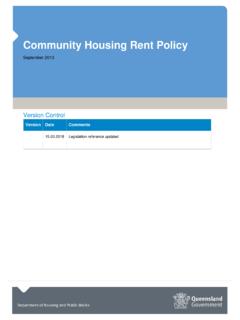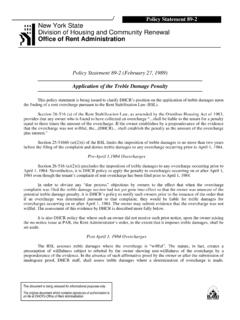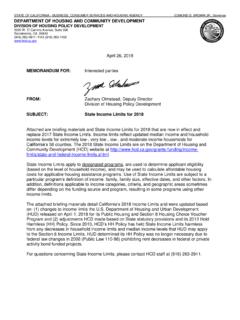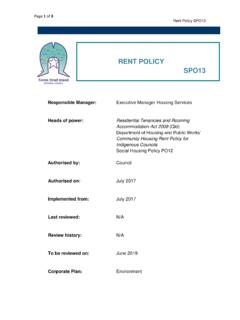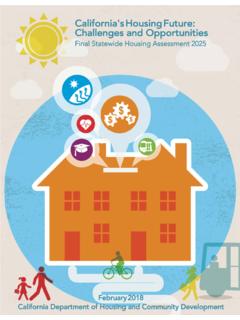Transcription of Housing at Risk - Toronto
1 Housing at Risk An Investigation into the Toronto community Housing Corporation's Eviction of Seniors on the Basis of Rent Arrears Fiona Crean OmbudsmanReport June 2013 2 Table of Contents Executive Summary .. 4 The Complaint .. 12 The Context .. 13 The Investigation .. 14 The Background .. 15 Social Housing in Toronto .. 15 TCHC Mandate and Structure .. 15 Ombudsman Report 2009 Housing Matters .. 16 Justice LeSage Report 2010 .. 17 Ombudsman Report 2012 .. 19 Legislative and Policy Framework .. 20 Housing Services Act, 2011 .. 20 Residential Tenancies Act 2006 .. 21 Eviction Prevention Policy and Guidelines .. 21 Promoting Successful Tenancies: Best Practices for When Our Tenants Are Vulnerable.
2 25 Mental Health Framework .. 27 Annual Review Process .. 29 Toronto community Housing Seniors Implementation Framework Sustaining Age-Friendly Communities .. 32 Senior Specific Operating Units .. 33 Senior's Lens Advisory Committee .. 35 Pathways Project .. 36 Toronto Seniors Strategy .. 37 The Facts .. 38 Implementation of Justice LeSage's Recommendations .. 38 TCHC Board Work Plan for Implementation .. 38 Update on the Eviction Prevention Work Plan and LeSage Review .. 41 Outstanding Actions Relevant to this Investigation .. 46 Compliance with Eviction Prevention Policy .. 50 Early Intervention with at-risk Tenants .. 50 Eviction as the Last Option .. 61 Record Keeping and Documentation.
3 67 Arrears and Repayment Process .. 68 3 Arrears in the Context of Fixed-Income Transitions .. 73 Communication with Tenants .. 76 Review of Decisions .. 80 Provision of Information on Eviction Process and Support Available to Tenants .. 81 Access to the Eviction Prevention Policy and Guidelines .. 81 Partnerships with community Agencies .. 82 Ombudsman Findings .. 83 Ombudsman Conclusions .. 99 Ombudsman Recommendations .. 101 TCHC's Response .. 105 Appendix A TCHC Shareholder Direction Excerpts .. 107 Appendix B TCHC's Response .. 109 4 Executive Summary 1. The Toronto community Housing Corporation (TCHC) is a non-profit Housing corporation owned by the City of Toronto . It is governed by a Board of Directors comprised of thirteen members, including members of City Council, citizens and two TCHC tenants.
4 2. TCHC manages 58,500 Housing units, providing Housing to almost 6% of Toronto s residents. 3. Ninety-three percent of TCHC tenants receive a rental subsidy and live in rent-geared-to-income (RGI) units. Of 26,809 seniors (59 or older), over 25,000 live in RGI units. 4. More than 6,500 TCHC seniors are over 80 years of age. 5. In October, 2009, Al Gosling died one month short of his 82nd birthday, five months after being evicted for arrears from his TCHC apartment, where he had lived for 21 years. The Honourable Justice Patrick LeSage was appointed by the Board of Directors to conduct an independent review of the eviction. 6. In his findings, Justice LeSage emphasized the importance of eviction prevention and personal contact with vulnerable tenants.
5 7. He noted that TCHC's application of its eviction prevention policies was either inconsistent or inappropriately used. 8. The Ombudsman made similar conclusions in two prior investigations in 2009 and 2012. After each, TCHC made policy revisions and developed guidelines to ensure fairness in eviction processes. 9. In October 2012, as a result of complaints, the Ombudsman initiated an investigation into the eviction of seniors for non-payment of arrears. The investigation centred on whether eviction prevention policies were applied consistently, and in keeping with Justice LeSage's recommendations. 10. Seventy-nine TCHC tenant files were examined, representing seniors evicted in 2011 and 2012. 5 11. The investigation findings are more unsettling in this case than previous investigations and inquiries, because the TCHC s prior undertakings and promises remain unfulfilled.
6 Freeze on Arrears 14. After the death of Mr. Gosling the number of annual evictions plunged dramatically, from about 1,850 applications to 800. By failing to enforce payment, more tenants fell into arrears, accumulating over time. In 2006, of tenants were in arrears. In 2012, the number had grown to 15. When the pendulum swung back, and TCHC began to vigorously enforce payment of rent arrears, many tenants were faced with insurmountable bills that had accumulated, sometimes over years. 16. For example, in Mr. A's case, he received monthly arrears notices for three years before TCHC took action. In 2009, he owed $2,000. By 2011, his debt was over $13,000, an impossible amount for a 70 year old on social assistance to repay.
7 Policy Framework 17. TCHC has a number of policies, protocols and strategies dealing with eviction prevention, seniors, mental health and vulnerability. 18. The Eviction Prevention Policy and Guidelines establish that evictions are a last resort and that three points of personal contact are required during the eviction process. 19. The Policy notes the need for early intervention, and says staff should identify vulnerable tenants with a higher risk of eviction, and respond to the discovery of their arrears promptly. 20. The investigation found that early intervention is often not occurring and in fact, eviction proceedings are not always used as a last resort. 21. The Vulnerable Tenants Protocol was drafted in 2009, for use "when a tenancy is at risk" or when a "potential crisis" is identified.
8 Justice LeSage lauded this Protocol. It was never implemented, although TCHC officials say its principles have been incorporated into their practices. 6 22. The Board has adopted other documents that deal with vulnerable tenants, including frameworks on mental health challenges and sustaining age-friendly communities. 23. However, it is unclear whether the strategies set out in these documents are being used. In cases where tenants were identified as vulnerable, there was no indication of a specific process to follow after this determination was made. 24. In the case of Mr. D, he was identified as vulnerable only after an eviction order was issued, despite documentation in his file of a serious mental health diagnosis and substance abuse.
9 25. If early identification and crisis prevention are occurring, they are certainly not happening consistently. If TCHC is providing tenants with access to supports, it is likely doing so too late. Annual Income Review 26. Each year rent-geared-to-income tenants in social Housing verify their eligibility by providing proof of income. The process is onerous and occurs at a frequency inappropriate for many seniors who have relatively stable incomes. 27. Since 2008, TCHC has been permitted by City guidelines to review rent every two years for tenants who meet the criteria. Provincial legislation also allows this. While other social Housing providers, including the City of Ottawa, have made the change, TCHC has not. Too Little Too Late 28.
10 Mr. B, who faced language barriers, moved into his apartment in 2006. Although he regularly had difficulties meeting his monthly rent, he owed rent arrears of only $45. 29. In January 2009, TCHC informed him that his rent had been increased retroactively because he was late in reporting an income change. As a result, he owed approximately $3,000 to TCHC. 30. Further arrears accumulated through 2009 and 2010. TCHC neither obtained a repayment agreement in writing, nor provided one to him to sign. In spite of his consistent failure to pay, TCHC did not make an application to the Landlord and Tenant Board (LTB) until June 2011. By the time Mr. B was evicted in March 2012, he had accumulated nearly $10,000 in arrears. 7 31.











